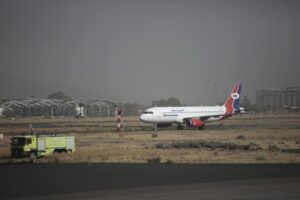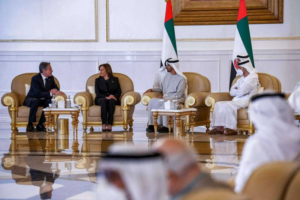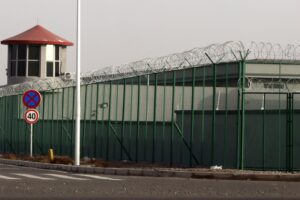
The National Interest Foundation Newsletter
Issue 147, May 19, 2022
Welcome to our NIF Newsletter. In this week’s headlines: Lebanon holds its election against the backdrop of the country’s major economic crisis and citizens’ growing disillusion with those in power, the first commercial flight in nearly six years takes off from Sanaa Airport in Yemen carrying hospital patients needing treatment abroad, a delegation of top American officials travels to the United Arab Emirates following the death of Sheikh Khalifa bin Zayed Al Nahyan, and leaked data highlights the massive scale of the Chinese government’s imprisonment of Uyghurs in Xinjiang.
Election in Lebanon

The recent election in Lebanon has signaled a rejection of the ruling class by many of its citizens. (Photo from AP)
Lebanon Holds Its Election Against the Backdrop of the Country’s Major Economic Crisis and Citizens’ Growing Disillusion with Those in Power
Lebanon held its election this past Sunday against the backdrop of the country’s major economic crisis and citizens’ growing disillusion with those in power. The results saw Hezbollah and its political allies fall short of a parliamentary majority. Analysts have highlighted that this outcome is largely due to the growing dissatisfaction that the Lebanese people have with the government. Their lackluster performance in addressing the growing financial crisis the country faces, on top of accusations of mismanagement and corruption, have all attributed to this lack of faith in the ruling class. One of the glaring examples of the perceived governmental incompetency is the Beirut port explosion back in August of 2020, which killed more than 200 people and damaged a large area of the capital city. The troubling incident has been widely seen as a blatant case of failure by officials in power to effectively govern. While this most recent election did signal an evident discontent with continued corruption and negligence, it is still a long way from the massive government overhaul that many in Lebanon desire.
Hezbollah has enjoyed a majority since 2018. The Iranian-backed group is considered a terrorist organization by the United States and others. The militant wing is often used to project power in Lebanon. A growing concern among election experts and observers is that there was no party which came out as a clear winner in the election. This could lead to political deadlock in the parliament and delay legislation that is necessary to bring the country back from economic ruin. The International Monetary Fund and international donors have made their funds conditional on significant changes to both the political and economic practices of Lebanon. So far, none of these conditions have been met. This governmental paralysis will likely worsen as a result of the election. This is because neither of the two major political blocs have secured a majority. A noteworthy amount of those newly elected are independent candidates and this has offered some hopeful sentiment. Sami Atallah, the founding director of The Policy Initiative, a Lebanese-focused think tank, said “We have a mosaic-like Parliament, and the presence of the new faces is interesting because they can press for new ideas and stop harmful ones.”
Despite Hezbollah and their allies losing a majority in the parliament, they still retain a large amount of power. Their militant wing does not answer to the parliament and can still affect policies. This makes it very unlikely that this new political composition will have any real change, but this is still an important step in fighting the rampant corruption and mismanagement that has plagued Lebanon.
The results of the election show a clear rejection of the ruling class. Unfortunately, this election was also marred by intimidation, campaign obstruction, and bribes. The fact that, even in the face of the multiple obstacles, members of the ruling class were voted out shows that the Lebanese people are hungry for change. This trend will likely continue and ultimately, it is hoped, bring about much-needed reforms. The danger does remain that if the ruling class is threatened, they will entirely dismantle the democratic system, as has been seen in other countries around the world. The growing trend of authoritarianism thinly veiled as democracy remains a threat, but it is still the hope of many experts and citizens that this will not take place in Lebanon.
Flight from Sanaa Airport in Yemen

The development is a milestone towards both humanitarian relief and peace within the embattled nation. (Photo from AP)
The First Commercial Flight in Nearly Six Years Takes Off from Sanaa Airport in Yemen Carrying Hospital Patients Needing Treatment Abroad
The first commercial flight in nearly six years has taken off from the capital city of Sanaa in Yemen as part of a two-month truce agreement between the warring parties there. The flight not only marks a potential important milestone in the efforts to alleviate the dire humanitarian situation in the country, but observers are hopeful that it could be another indicator of a more permanent peace deal between the Yemeni government and the Houthi rebels. It has also raised the spirits of many Yemenis on the ground. There are an estimated 300,000 patients awaiting the resumption of flights for humanitarian and medical purposes, according to the Houthi-run ministry of health. Medical facilities inside the war-ravaged country do not have the ability to treat many of the wounded due to a lack of supplies and training as a result of the longstanding conflict.
The ongoing truce in Yemen began on April 2nd, coinciding with the start of the Muslim holy month of Ramadan. So far, the cessation of hostilities arrangement has held. Some of the other critical agreements that have been reached in principle, along with the resumption of commercial flights in and out of Sanaa, include reopening roads to the rebel-besieged city of Taiz and allowing fuel tankers through the Saudi blockade in order to deliver much-needed fuel. Though it has been relatively successful to this point, tensions remain high. Original plans for the first flight had to be scrapped, with both sides blaming each other for the delays. There have also been several accusations of each other respective side violating the truce.
The milestone flight carried 137 passengers, many of whom were patients needing treatment abroad whose families also accompanied them. It is the hope that this will be the first of numerous flights that will help transport out those who require medical treatment and transport in desperately needed humanitarian aid. The Norwegian Refugee Council (NRC) described this flight as a “stepping stone towards sustainable peace.” The NRC expressed that if the parties keep working together, these flights could help save thousands of lives, as well as start to revive the country’s crippled economy. More flights are scheduled with the possibility of other ones to be added. These flights are tangible actions that may show the warring parties that peace is not only possible, but will also be mutually beneficial to all of those involved.
The conflict in Yemen, which started in 2015, has caused the death of over 370,000 people according to United Nations estimates. 60% of these deaths were from indirect causes, such as lack of food, water, and health services. Two out of three Yemenis are currently in need of humanitarian aid and protection. Despite the truce, the situation remains dire. Much of Yemen’s infrastructure, including hospitals, roads, and schools, has been destroyed by the fighting. The Russian invasion of Ukraine has also worsened the food shortages, with 2.5 million children suffering from acute malnutrition. In the face of all of these struggles, the Yemeni people are working hard to try and alleviate the circumstances. Many are attempting to resume their businesses, while others are working to rebuild their shattered homes. There is a long way to go, but with continued efforts to halt hostilities, peace may be more attainable now than it was in recent years.
U.S. Delegation Travels to the UAE

The Biden administration sent a high-profile delegation to the Gulf nation following the death of Sheikh Khalifa bin Zayed Al Nahyan. (Photo from AFP)
A Delegation of Top American Officials Travels to the United Arab Emirates Following the Death of Sheikh Khalifa bin Zayed Al Nahyan
The United States sent a high-level delegation to the United Arab Emirates this week following the death of Sheikh Khalifa bin Zayed Al Nahyan. He was the nation’s second president and had ruled the country since 2004, retaining ceremonial powers but assuming a lower profile in state affairs following a stroke in 2014. At that time, his half-brother Mohamed bin Zayed Al Nahyan became the de facto ruler and has since carried out public affairs of the state and day-to-day decision making. The traveling American delegation led by U.S. Vice President Kamala Harris included CIA Director William Burns, Secretary of State Antony Blinken, Secretary of Defense Lloyd Austin, and Climate Tzar John Kerry. Their trip comes as the United States attempts to boost bilateral relations, which have recently come under strain. The U.S. reversal of the Houthi rebel terrorist designation for humanitarian purposes and increased condemnation of the devastating Saudi and UAE-led war in Yemen has caused relations between the two states to become frayed. The UAE has also expressed concern that the U.S. is leaving its security commitments in the region. As the UAE is a major oil provider and with record-setting gas prices in the United States, the Biden administration feels that enhancing ties is a necessary step.
The notable delegation is the United States’ largest show of support and will to improve bilateral relations with the UAE since the Biden administration took office. Last month, Secretary of State Tony Blinken apologized to the UAE for its lack of response to a Houthi attack on Abu Dhabi. Some analysts have highlighted the particular significance of this, considering that the United States removed the Houthi rebel terrorist designation for humanitarian reasons last year. The move was criticized by the UAE and Saudi Arabia; however, it has been widely supported by human rights activists as it allows for fewer restrictions on humanitarian assistance that is increasingly needed to address the dire crisis in Yemen.
The members of the U.S. delegation are some of the highest and most public members of Biden’s cabinet. The makeup is mostly foreign policy officials in an attempt to show the U.S. still has a focus on Gulf region issues. The UAE has expressed concern in light of the war in Ukraine that the U.S. will begin to shift global attention away from Gulf security issues to Eastern Europe. They argued that the Biden administration had refused to attempt to assure partners and allies in the region that the U.S. still maintains a commitment, especially as it has pulled out of Iraq and Afghanistan. By sending this delegation along with ensuring that arms deals go through, the Biden administration hopes to reassure not only the UAE, but the greater Gulf region.
The Biden administration’s decision to try and mend bilateral ties through this large and high-profile delegation following the UAE leader’s death is in no small part related to the UAE’s large oil capacity at a time in which the U.S. is increasingly concerned with combating the skyrocketing prices. While this decision will have benefits and could see improvements in working with the UAE to combat the humanitarian crisis in Yemen, it is imperative that human rights are not on the negotiation table.
Scale of Uyghur Imprisonment in Xinjiang

The data shows that a county in Xinjiang has the highest known imprisonment rate in the world. (Photo from AP)
Leaked Data Highlights the Massive Scale of the Chinese Government’s Imprisonment of Uyghurs in Xinjiang
A data leak has shed further light on the enormous scale of the Chinese government’s imprisonment of Uyghurs in the Xinjiang region. The troubling finding reveals that approximately one in 25 people in a county there have been sentenced to prison, the highest known such rate in the world. For years now, human rights activists have tried to draw attention to the brutal crackdown and abuses against the minority group at the hands of Chinese authorities. Impartial analysts and experts have outlined the deliberate targeting of Uyghurs on trumped-up charges, which has resulted in millions being arbitrarily detained and imprisoned. The secretive nature of the spurious charges is particularly alarming as well. While China makes its legal records easily accessible otherwise, almost 90% of these in Xinjiang are not public. The information uncovered this week is the largest list to-date with the names of imprisoned Uyghurs, and validates the concerns that Chinese authorities are using a system of long-term incarceration to unjustly oppress them.
The list of imprisoned Uyghurs in Xinjiang was passed on to The Associated Press by an exiled Uyghur linguist in Norway, Abduweli Ayup. It was then thoroughly authenticated via interviews with people who recognized names on the list, in addition to legal documents, recordings of phone calls with Chinese officials, and verification of personal information. The data consists of Uyghur citizens who have been imprisoned on bogus charges related to “terrorism” and “religious extremism,” and does not include people convicted of more common offenses like theft. Thus, many observers suspect that the actual number of those imprisoned in the region is even higher than the already shocking and global-record rate. In some documented cases, Uyghurs from entire villages were detained and whole families collectively uprooted from their homes. The methodical and intentional targeting of solely members of the Uyghur minority group has all been done under the guise of “combatting terrorism,” and has drawn widespread criticism and condemnation from rights activists, international organizations, and foreign government officials.
Konasheher county, the site of the disturbing statistics in the Xinjiang region, is home to more than 250,000 residents. The leaked data showed that the massive scale of prison sentences across the county ranged from two to 25 years, with an average of nine years. Even with a conservative estimate which does not include those locked up on legitimate crimes like robbery, Konasheher county’s imprisonment rate is over 10 times higher than that of the United States. Additionally, it is also more than 30 times higher than the country of China’s as a whole, according to the most recently released figures on this. All of this helps to emphasize the extent of the Chinese government’s oppression campaign toward Uyghur citizens in Xinjiang.
The data leak this week is just the latest evidence of the Chinese regime’s human rights violations against the persecuted Uyghur minority group. Reputable rights groups and organizations have documented the scope of these abuses in the preceding years, as well as the clear systematic and state-organized nature of them.
Enter the text or HTML code here
